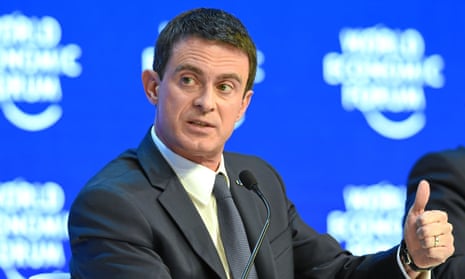Manuel Valls, the French prime minister, has raised doubts about whether David Cameron can reach a deal with fellow European leaders on his European Union reform package at a summit next month.
As Cameron said he is prepared to wait until next year to secure the right reforms, his French counterpart said that Paris would not agree to a deal with the UK at any price. But the French prime minister added that it would be a tragedy if the UK left the EU.
The interventions by the two prime ministers, who spoke during separate appearances at the World Economic Forum in Davos, came amid renewed momentum in Whitehall pushing the idea of an extra EU summit to thrash out a deal.
The Guardian reported last week that Donald Tusk, the European council president, may call a second summit towards the end of next month if EU leaders fail to reach agreement at their next scheduled meeting on 18-19 February. This would allow the Cameron to hold the referendum on Britain’s EU membership by the end of June, possibly on 23 June.
Valls questioned whether a deal could be agreed by mid-February. He was reported by Politico as saying in Davos: “I think it will need more time. The discussions only started a short time ago. We have to do everything we can to make Britain stay. Not on any conditions, that would be senseless. But there are some demands and requests that are acceptable: to have a Europe that is more simple, that works better, that is more effective.
“Anything that we can agree would not only be be great for Britain, but for the whole of Europe. We have to find a compromise and everyone can contribute to that. I hope the summit in February will at least let us take decisive steps forward.”
Cameron would like to hold the referendum by the end of June on the grounds that it would be risky to wait until September, by which time Europe could have experienced another summer migration crisis. The prime minister could wait until the end of 2017 to hold the referendum, but he is keen not to allow the EU negotiations to drag on. He is also conscious of the risks of holding the referendum in a year that sees French and German presidential elections.
But the prime minister highlighted one of his central messages in Davos – that achieving success on the substance of his reforms is his most important priority – when he raised the prospect of waiting until 2017. “If there’s a good deal on the table, I will take it,” he said. “But if there isn’t the right deal, I’m not in a hurry. I can hold my referendum any time up until the end of 2017.”
In an appeal for business backing, Cameron said the referendum would be “a once-in-a-generation moment and the stakes are high”.
He said: “The voice of business must be heard in Britain and across the whole continent. If you want a more competitive Europe, where the single market is completed, where there are more trade deals and fewer regulations, join me in making that case. If you believe, like I do, that Britain is better off in a reformed European Union, then when the time comes, help me make that case for Britain to stay.”
In June, Sajid Javid, the business secretary, criticised the Confederation of British Industry for making it clear that it would support staying in the EU regardless of the success of the prime minister’s renegotiations.
“You know how negotiation works. You wouldn’t sit down at the start of a merger or acquisition and, like a poker player showing his hand to the table, announce exactly what terms you were prepared to accept,” said Javid. “It doesn’t work in the boardroom and it won’t work in Brussels.”

Comments (…)
Sign in or create your Guardian account to join the discussion